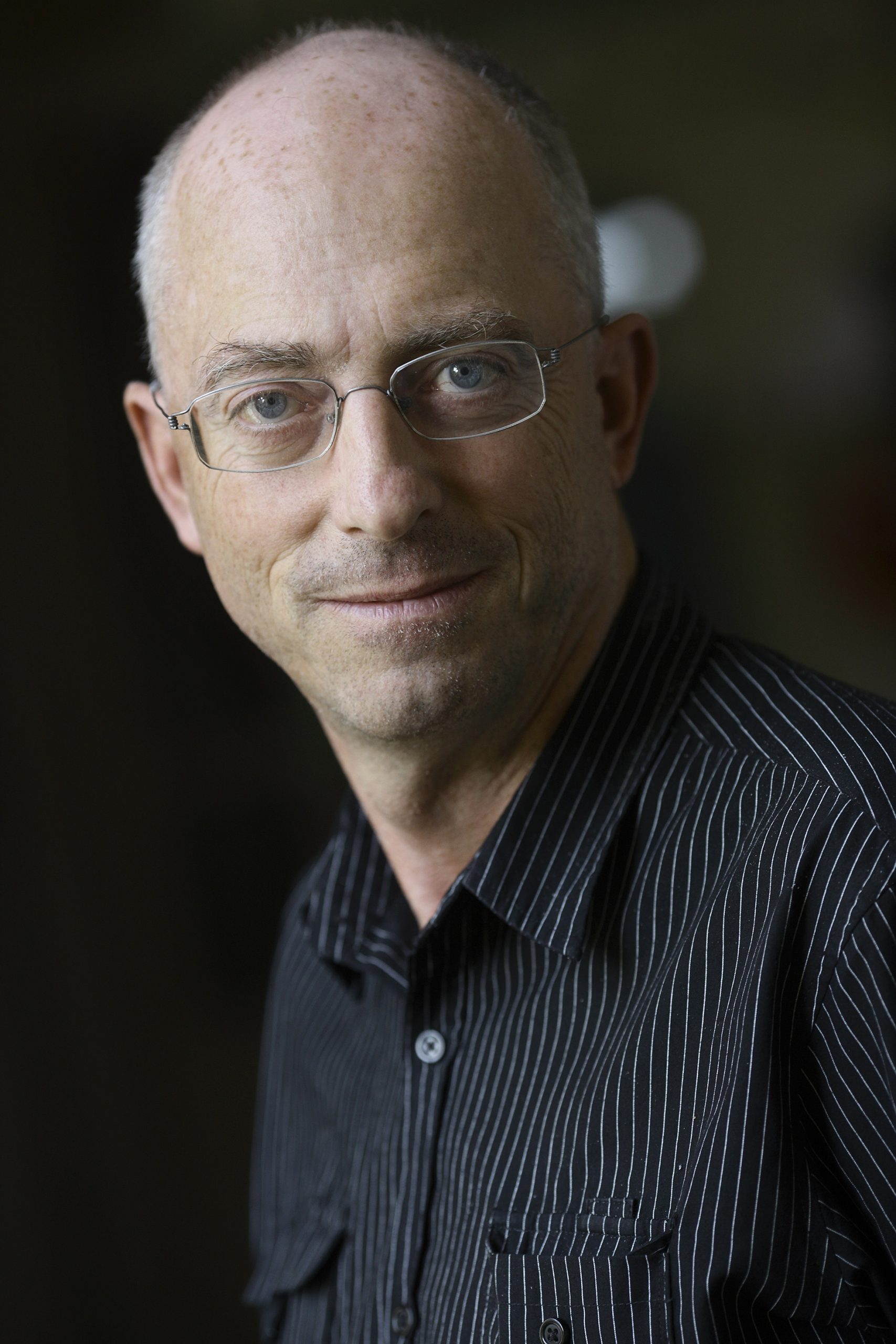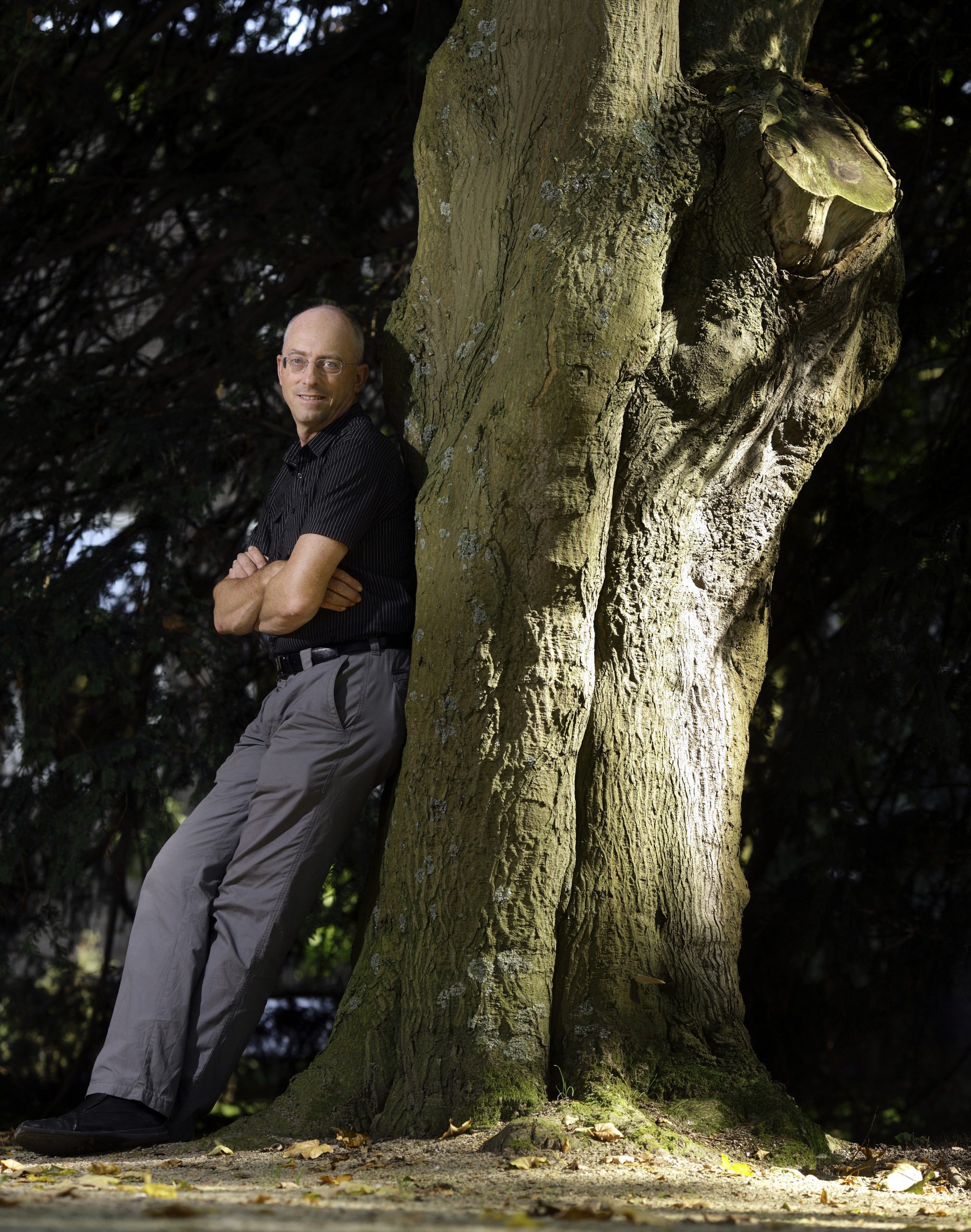In the future, we will flush our toilets with seawater and the sewage system will become a source of raw materials. This is according to Spinoza prize-winner and water purification expert Professor Mark van Loosdrecht.
A slightly futuristic dwelling – not dissimilar to those on many a University of Technology campus – collects urine and faeces separately. The faeces are sent to a fermentation unit and the resulting methane can be used to heat the house. Flushing away excrement is a complete waste and the same can be said of course of clean water. Although it may seem that our sewage system needs updating, nothing could be further from the truth, according to Mark van Loosdrecht. “If I had to completely redesign the Dutch sewage system, I would make it exactly as it is now”, he says, when asked.
The professor in environmental biotechnology and water purification in the Faculty of Applied Sciences is not one for hypes or pretentiousness. His down-to-earth attitude has been richly rewarded. This summer, he was awarded the Spinoza Prize, the highest science award in the Netherlands, for his ground-breaking research into the ecology of micro-organisms in sewage water. Mark is the mastermind behind two new water-purification techniques: Nereda technology, which enables water-purifying bacteria to grow in rapidly-settling granules and Anammox technology, which is used to convert damaging ammonia and nitrite into harmless nitrogen gas and water.
After his sobering response to the first question in the interview, a brief silence ensues.
You really wouldn’t change anything about the sewage system?
“On that front, our business is in order, so to speak. We have been free of cholera and typhoid since the late 19th century. Of course, there are some ways it could be optimised. In the future, for example, we will use seawater to flush our toilets and produce raw materials from sewage water. But the basic theme remains the same. Water flows into the city, it takes all of the waste with it and is collected and processed outside the city. Exactly the way the Babylonians devised it, 3,000 years ago.”
Use seawater to flush the toilet?
“Yes. In Hong Kong, it’s already quite normal.Most mega-cities are located on the coast. If there is a shortage of fresh water, it is an obvious strategy to flush the toilet using seawater. Salt water also opens up new opportunities for water purification.”
You have now been given EUR 2.5 million. How do you plan to use the money?
“We know virtually nothing about 99% of all bacteria. We don’t know how they respond to changes in the environment, such as the availability of nutrients. Bacteria use change for a competitive advantage. For example, some can store fats in order to see off competitors during periods when nutrient levels are low. I am convinced that this kind of knowledge about ecology will enable us to produce raw materials from sewage water: bio-plastics, for example. Since the oil crisis in 1973, scientists have been attempting to make these from sugar. But nobody ever asked themselves what the significance of a particular substance was for micro-organisms and how they can be encouraged to produce it.”
You studied environmental technology in Wageningen. Would biology not have been a better choice?
“I was interested in biology, but was not impressed by the degree programme. Biologists are like stamp collectors: they want to label and categorise everything. The biology programme involves learning a lot of names and facts. I don’t have a very good memory. The environmental technology programme in Wageningen included a lot of chemistry and physics, which suited me much better. If you understand the principles of these subjects, you can extrapolate the rest.”
What fascinates you so much about micro-organisms?
“They form complex living communities. How does that life fit together? They are puzzles. We know very little about bacteria, but we do know that if we change the conditions in a certain way, it will result in a creature that makes granules or bio-plastics. In the water purification system, there are billions of bacteria. They divide on an hourly basis, so after just a few days, they can be completely different.”
You turn the switches…
“Yes, and evolution takes its course.”
How did you end up in water purification?
“After my doctoral research in Wageningen, on the subject of the transport of bacteria through the ground, Sef Heijnen (professor of biotechnology at Applied Sciences, Ed.) asked me if I wanted to work here. I was simply in search of a job. I started by looking for work in industry and had already had two interviews at DSM. They were in the process of evaluating things, which was taking quite a while. Then I opted for TU Delft. The job at DSM was about the physical chemistry of baking bread.” And he adds with a laugh: “That is another fascinating subject.”
Why the laugh?
“Because it sounds so traditional, baking bread, but its not an easy task to get the bubbles just right. It just shows that a job in water purification wasn’t my particular ambition in life. If I had been offered work at Wageningen with a focus on water purification, I wouldn’t have taken it. The group there has a tendency to focus on applied research. I prefer to research the basics and then see how they can be applied. Application is not my primary objective.”
Is that why you work in a university and not in industry?
“On balance, the university is an enjoyable employer. I can focus on things that I consider important. Making raw materials from waste will be our next area of focus. A company will never take the first steps. Around the year 2000, when we started with Nereda, companies would not have been interested in ideas about sludge granules. Back then everyone was obsessed with membrane bioreactors, which were seen as the future. It was a real hype. At the university, you can happily ignore hypes.”
Nereda is your baby.
“It feels like that, yes.”
Are you following Nereda around the world, for example, to Brazil? Twelve Nereda plants are currently being built there.
“No, I’m not going to Brazil. Technology can often be held back because inventors cling to their inventions too much. It is better to leave things to the market. As an inventor, you are not always the right person to bring the technology to the people. The technology has been passed on to the engineering firm DHV. If I really had wanted to become involved, I would have had to join the company.
“That is how things are supposed to work at TU Delft. You mustn’t spend too long putting things into practice and you shouldn’t build your whole career on a single success. I think I could easily have set another 10 doctoral candidates to work on Nereda technology. But I want to move onto the next development. Otherwise, it all becomes too much like a university of applied science.”
You now want to focus on alginate, a type of gel used in the pharmaceutical and food industry.
“The bacteria in the granules produce alginate, something we only discovered years after the technology had been developed. Alginate is an expensive material that is currently extracted from brown algae. In the past, people thought that the bacteria that make this material simply excreted it. That made it difficult to establish an industrial production process using bacteria, because you cannot stir a gel. However, with Nereda it emerged that the material is actually in granules. If all water purification in Utrecht were to switch to Nereda, enough alginate would be produced to meet 5% of global demand.”
You are not a great believer in the separated collection of urine and faeces. Is that because it cannot be effectively combined with Nereda?
“Reclaiming raw materials is a scale-dependent process. To that extent, it is the reason why I think we should not introduce segregated collection locally. Besides that, collecting urine and faeces separately requires a lot of material.
In the Third World, I do see a future for decentralised toilets, because large-scale sanitation is difficult to get off the ground. Governments prefer to invest in military hardware than install a sewer. High-ranking politicians should rally behind sanitation projects. When the Dutch king goes on a working visit, that is the kind of project he looks at. Your average president doesn’t officiate at the opening of a village toilet.”
Are you a workaholic?
“Of course. I can’t deny that. But workaholics come in two varieties. One type does it for the career prospects: he is scared of losing his job or wants to become the manager of the business. That’s not what motivates me. The other type, like me, wants to find out how things work. That involves a different type of stress. I have no ambition to become head of department or dean. I don’t have the patience to sit through long meetings. Besides, at TU Delft, there is actually no higher position than that of professor. Professors are the face of the university.
I may be a workaholic, but I go on holiday for two months every year. I have absolutely no problem with being cut off from the outside world. I go to the Himalayas, the Andes or the Alps, to the mountains and the panoramic views.”
 CV
CVCV
Mark van Loosdrecht (1959) won one of the three NWO Spinoza prizes this summer. He studied environmental technology in Wageningen and was awarded his doctorate there in 1988 for research into the distribution of bacteria in the ground (‘Adhesion of bacteria and the effects of adhesion on the microbial activity’). He was then offered a research position at TU Delft. He studies and influences the properties of bacteria in water purification systems. Last year, he was awarded the Simon Stevin Master Prize 2013 (worth EUR 500,000) by the STW Technology Foundation for the development of two new water purification technologies using micro-organisms: the anammox and granular sludge technologies (Nereda). Only two other researchers have previously won both this and the Spinoza prize (DetlefLohse and Albert van den Berg, both from the University of Twente.) There’s no shortage of prizes. In 2012, Van Loosdrecht was awarded the prestigious Lee Kuan Yew Water Prize in Singapore.



Comments are closed.